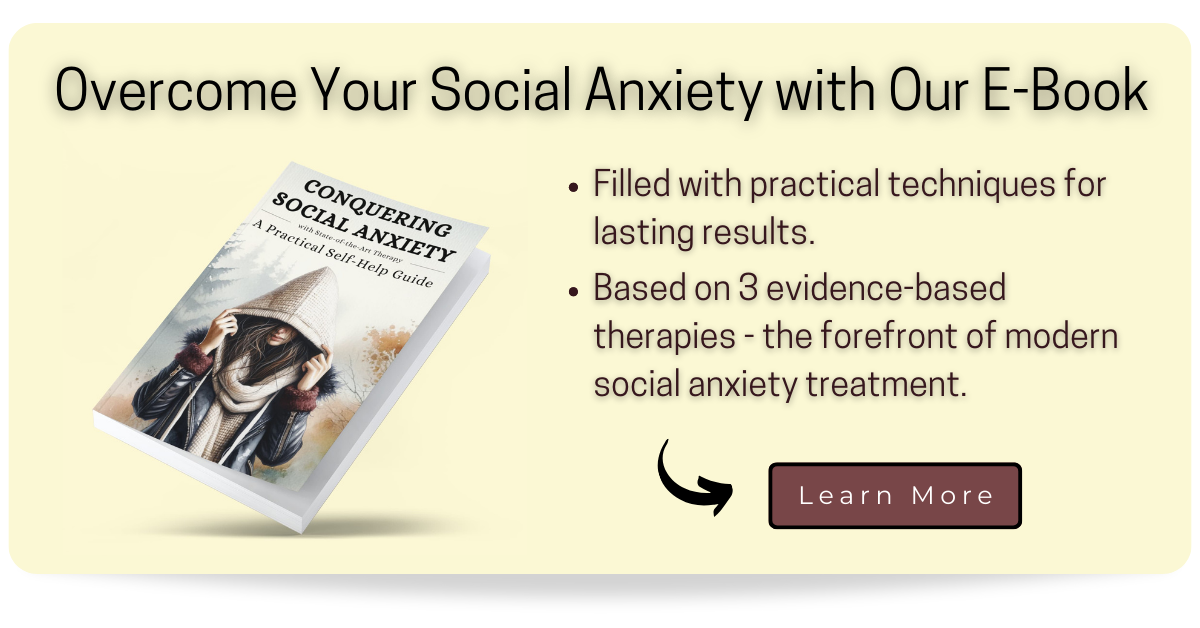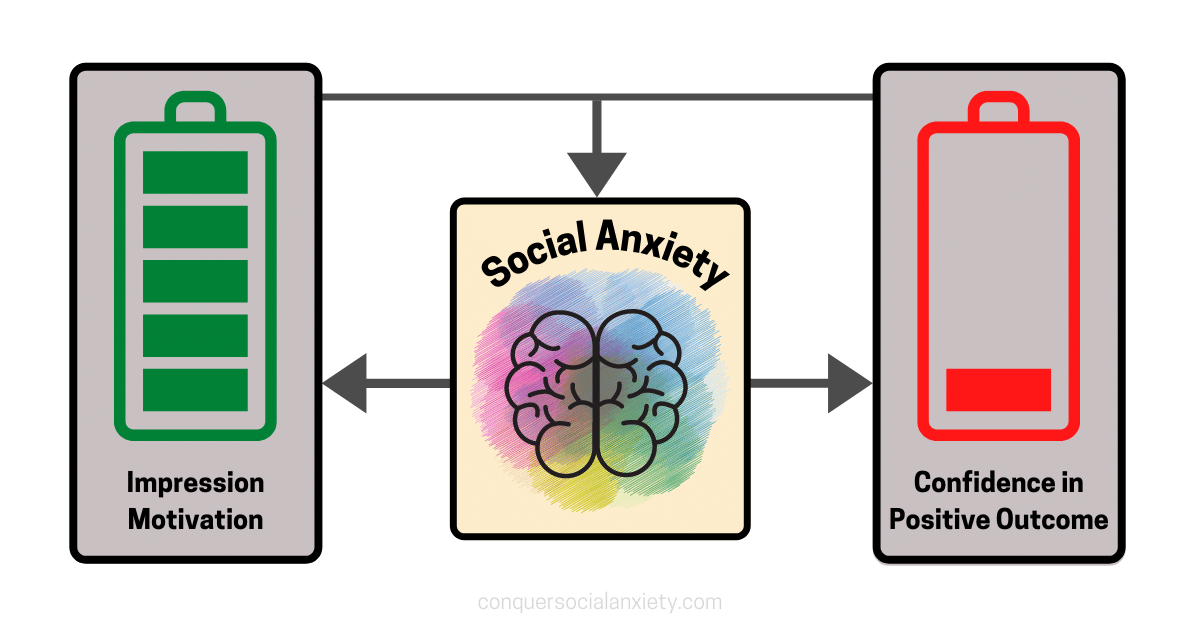Does It Matter What Others Think of You?
“You should not worry about what others think of you.” – You have probably heard this many times.
But is that really good advice? Is it sign of self-confidence if you do not care about other people’s opinions of you? Is this something to strive for?

It is normal to care about the opinions others have of us. The impressions we make on others have an important impact on all life domains. They affect our relationships, our professional life, and our well-being in general. Being liked and accepted by others is a basic psychological need.
In other words: being somewhat concerned about what others think of you is perfectly normal and it is even adaptive.
However, this does not mean you cannot overdo it. When these concerns become excessive, you may struggle with social anxiety.
This means that there is a sweet spot of concern: neither too little, nor too much.
Let’s examine this in more detail.

Impression Management & Self-Representation
People usually keep an eye on how they come across. Most of the time, they do so without trying to generate a particular impression on others, but just to make sure others still hold them in positive regard.
However, sometimes people are motivated to be perceived in a particular way.
The terms impression management and self-representation have been used interchangeably to describe our attempts to influence what other people think of us (Leary & Kowalski, 1990).
Everyone engages in these attempts. Whether you are on a diet, think about what clothes to wear, what to say when meeting new people, or have a job interview – you are trying to be perceived in a specific way.

This is even true for those who allegedly do not care about what others think of them.
A teenager who dresses provocatively and “always” says what’s on their mind may try to be perceived as someone who is independent of the opinion of others. However, the desire to be perceived this way reveals the exact opposite.
Impression management is an important aspect of our daily lives. We evolved living in groups, strongly depending on being accepted and included by the other members of our tribe.
It was crucial for our survival to be perceived as a valuable member of the community. Those who were not, were excluded from the community and left without any chances of making it on their own.
Sensing when others disapprove of us helps us adjust our behavior, so we can be liked and accepted, land a good job, find an attractive partner, and so on. Self-representation can help us improve our odds of living a happy life.
As you can see, it is helpful to worry about what others think of you. But, what happens when these concerns go overboard?

Impression Motivation & Social Anxiety
When we are motivated to be perceived in a specific way, we can adjust our behavior to obtain the desired result. However, this is not always possible.
You can be motivated to have others think that you are very intelligent, for instance. This may not be a problem for you under normal circumstances.
But if you want to generate this impression on a group of high-achieving academics, you may perceive this as a major challenge and struggle to do so.
When our desire to be seen in a particular way is high, and our confidence in our ability to generate this impression is low, social anxiety is the result.

When we get socially anxious, a vicious cycle can be set in place. We sense that we are anxious, which typically increases our desire to manage our impression. After all, we do not want to be seen as anxious and insecure.
At the same time, our social anxiety makes us feel even less confident in generating the desired impression. If you are anxious, it can be hard to be perceived as capable, intelligent, funny, confident, and so on.
How to Reduce Social Anxiety?
To break this vicious cycle, you may want to use the following questions as a helpful guide:
- In what situations do you experience social anxiety?
- What is the impression you usually try to generate?
- What can you do to improve your confidence in being able to generate this impression?
- Why do you think being perceived this way is so important to you?
- How can you grow more tolerant of not being perceived this way?
- How would you like to handle anxiety in social situations and how can you achieve this?

How you should address your social anxiety depends on numerous variables.
If you only experience it in some specific scenarios, you may be well advised to practice skills that will help you make the desired impression.
For example, if you want to be perceived as knowledgeable, there is nothing wrong with starting to read more and taking classes in the topics of your interest.
If you want to be perceived as a confident public speaker, join toastmasters and practice your public speaking skills.
However, if your social anxiety is more persistent and shows up in many situations, you may need to take a different approach.

Social Anxiety Treatment
In its more severe version, social fears can turn into social anxiety disorder. At this point, the person is significantly impacted by the desire to be perceived in a specific way.
Affected people often stop engaging in normal social activities, like parties, family gatherings, and dating.
Others may refrain from getting a college degree due to the fear of participating in larger groups, or they stay below their professional potential because they shy away from intimidating social duties.
When this is the case, professional help may be warranted. There are a number of therapeutic approaches to social anxiety disorder that have been proven to be effective treatments.

Treatment for social anxiety usually takes about 12 weeks and can lead to significant improvements. Among the most commonly applied approaches are:
- cognitive behavioral therapy
- psychodynamic therapy
- interpersonal therapy
- mindfulness-based therapy
However, there are more options for those who do not improve through standard treatment.
For a complete overview, you may want to read our eBook that summarizes the 17 distinct therapeutic approaches to social phobia that have been proven effective. You can click here to be taken to our store, where you can purchase it for immediate download.
Practical Tips for Social Anxiety
For those who do not suffer from social anxiety disorder, but who would like to reduce their social fears regardless, we have put together a couple of practical tips:
- Seek repeated exposure to the situations that scare you. Your brain and body will get used to them, and you will learn that there are no serious consequences of not being perceived exactly as you desire. This strategy is an important element of CBT for social anxiety. You can click here to be taken to our introductory guide, which explains how this popular therapy approaches social phobia.
- Practice to be perceived exactly in the way you dread. This will increase your tolerance and decrease your social anxiety. Shame attacking exercises work very well for this purpose. If this approach interests you, we recommend that you click here to be taken to our article that explains it in more detail.
- Learn and practice deep breathing. It is a practical breathing technique that can help you manage anxiety symptoms as they come up.
- Start meditating. Regular mindfulness practice has been shown to change the brain in ways that reduce social anxiety and improve emotional control. Click here to be taken to our comprehensive guide on mindfulness and meditation for social anxiety, which includes guided meditations to get you started.
- When you get anxious in social situations, focus your attention on the task at hand, such as paying attention to what is being said, what you are saying, and so on. When you focus shifts to your anxiety, take notice and gently bring it back to the task at hand.


Pin | Share | Follow
[DISPLAY_ULTIMATE_SOCIAL_ICONS]
Leary, M. R., & Kowalski, R. M. (1990). Impression management: A literature review and two-component model. Psychological Bulletin, 107(1), 34–47. https://doi.org/10.1037/0033-2909.107.1.34

About the Author: Martin Stork
Martin is a professional psychologist with a background in physical therapy. He has organized and led various support groups for people with social anxiety in Washington, DC and Buenos Aires, Argentina. He is the founder of Conquer Social Anxiety Ltd, where he operates as a writer, therapist and director. You can click here to find out more about Martin.











